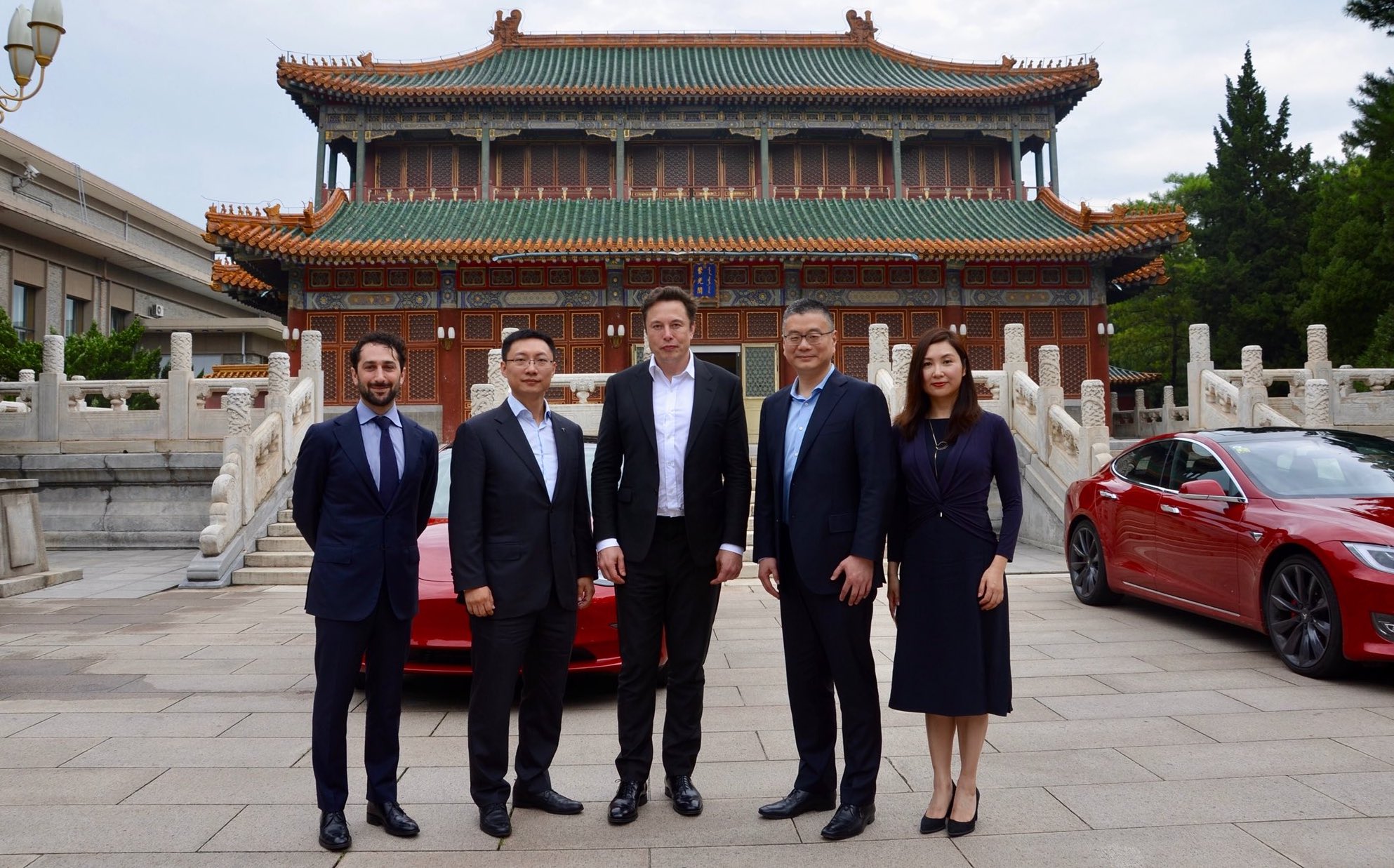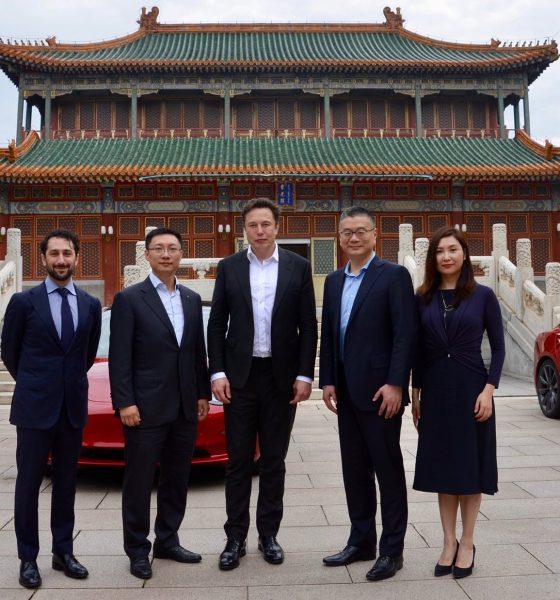

Investor's Corner
Elon Musk delves into Tesla’s China Gigafactory funding and development plans
During Tesla’s Q2 2018 earnings call on Wednesday, CEO Elon Musk and Tesla’s executive team revealed details about the company’s plans for Gigafactory 3 in China. The overseas facility is a strategic move that will allow the California-based company to compete in China’s local electric car market and minimize logistical challenges with shipping abroad. More importantly, having a local presence will allow Tesla to skirt steep import tariffs placed on vehicles that are brought into the country.
Considering Tesla CEO Elon Musk’s stance on Tesla not needing a capital raise, and with the company well into its process of leaving Model 3’s production hell, concerns are abounding about the company’s capability to fund the Shanghai project. After all, if Gigafactory 1’s estimated $5 billion cost is any indication, Gigafactory 3 would likely require a substantial investment. Joseph Spak of RBC Capital Markets addressed this concern during the Q2 earnings call, when he asked about the linear costs for the upcoming facility.
Musk stated that Tesla’s next Gigafactory would likely not cost as much as Gigafactory 1 in Nevada, with the project having closer to $2 billion CapEx, not more than half the CapEx of Gigafactory 1.
“We’re confident we can do the Gigafactory in China for a lot less. I think it’s probably closer—this is just a guess—to $2 billion. That would sort of be the 250,000-vehicle per year rate. So, I think we could be a lot more efficient with cutbacks and that would include at least the battery module and pack production, body shop, paint shop, and general assembly. It might even be less than that.”
Tesla CTO JB Straubel also noted that lessons learned from Gigafactory 1 would be applied to the upcoming facility. According to Straubel, Tesla had already increased production rates by 20% just through tweaks in the production line of its US facilities without CapEx. With “strategic” CapEx, Straubel stated that Tesla can achieve more.
“We found a surprising amount of ways to improve efficiency and speed and density as well in Gigafactory 1. And all those lessons will absolutely be shared with Gigafactory 3. The teams are already, of course, beginning to collaborate and start to do this more efficiently with less cutbacks than last time,” he said.
Consumer Edge Research analyst James Albertine also inquired about the China Gigafactory, asking about where Tesla intends to find funding for the project. According to Musk, Tesla intends to access loans from local banks in China. Plans are also underway for Tesla to start paying off loans with internal cash flow, instead of refinancing. Musk also noted that while construction for the facility would be underway, Tesla’s initial investment will not start “in any significant way” until 2019.
“We will not be raising any equity at any point. At least, I don’t have expectations or plans to do so. For China, our plan will be to use a loan from the local banks and fund the Gigafactory in Shanghai with local debt, essentially. We could raise money, but I don’t think we need to. I think it’s better to just not to. The whole plan is we start paying off our debts. I mean, paying them off. We expect to pay that off with total cash flow.”
Unlike Gigafactory 1 in Nevada, Gigafactory 3 will be a facility that incorporates both battery pack and electric car production. In true Tesla fashion, Gigafactory 3 is following an aggressive timeline, with construction set to begin as soon as the necessary permits are completed. Tesla expects to start producing vehicles in the facility as early as 2020. Once complete, Gigafactory 3 is expected to produce 500,000 vehicles per year.

Elon Musk
Tesla stock gets latest synopsis from Jim Cramer: ‘It’s actually a robotics company’
“Turns out it’s actually a robotics and Cybercab company, and I want to buy, buy, buy. Yes, Tesla’s the paper that turned into scissors in one session,” Cramer said.

Tesla stock (NASDAQ: TSLA) got its latest synopsis from Wall Street analyst Jim Cramer, who finally realized something that many fans of the company have known all along: it’s not a car company. Instead, it’s a robotics company.
In a recent note that was released after Tesla reported Earnings in late January, Cramer seemed to recognize that the underwhelming financials and overall performance of the automotive division were not representative of the current state of affairs.
Instead, we’re seeing a company transition itself away from its early identity, essentially evolving like a caterpillar into a butterfly.
The narrative of the Earnings Call was simple: We’re not a car company, at least not from a birds-eye view. We’re an AI and Robotics company, and we are transitioning to this quicker than most people realize.
Tesla stock gets another analysis from Jim Cramer, and investors will like it
Tesla’s Q4 Earnings Call featured plenty of analysis from CEO Elon Musk and others, and some of the more minor details of the call were even indicative of a company that is moving toward AI instead of its cars. For example, the Model S and Model X will be no more after Q2, as Musk said that they serve relatively no purpose for the future.
Instead, Tesla is shifting its focus to the vehicles catered for autonomy and its Robotaxi and self-driving efforts.
Cramer recognizes this:
“…we got results from Tesla, which actually beat numbers, but nobody cares about the numbers here, as electric vehicles are the past. And according to CEO Elon Musk, the future of this company comes down to Cybercabs and humanoid robots. Stock fell more than 3% the next day. That may be because their capital expenditures budget was higher than expected, or maybe people wanted more details from the new businesses. At this point, I think Musk acolytes might be more excited about SpaceX, which is planning to come public later this year.”
He continued, highlighting the company’s true transition away from vehicles to its Cybercab, Optimus, and AI ambitions:
“I know it’s hard to believe how quickly this market can change its attitude. Last night, I heard a disastrous car company speak. Turns out it’s actually a robotics and Cybercab company, and I want to buy, buy, buy. Yes, Tesla’s the paper that turned into scissors in one session. I didn’t like it as a car company. Boy, I love it as a Cybercab and humanoid robot juggernaut. Call me a buyer and give me five robots while I’m at it.”
Cramer’s narrative seems to fit that of the most bullish Tesla investors. Anyone who is labeled a “permabull” has been echoing a similar sentiment over the past several years: Tesla is not a car company any longer.
Instead, the true focus is on the future and the potential that AI and Robotics bring to the company. It is truly difficult to put Tesla shares in the same group as companies like Ford, General Motors, and others.
Tesla shares are down less than half a percent at the time of publishing, trading at $423.69.
Elon Musk
Tesla to a $100T market cap? Elon Musk’s response may shock you

There are a lot of Tesla bulls out there who have astronomical expectations for the company, especially as its arm of reach has gone well past automotive and energy and entered artificial intelligence and robotics.
However, some of the most bullish Tesla investors believe the company could become worth $100 trillion, and CEO Elon Musk does not believe that number is completely out of the question, even if it sounds almost ridiculous.
To put that number into perspective, the top ten most valuable companies in the world — NVIDIA, Apple, Alphabet, Microsoft, Amazon, TSMC, Meta, Saudi Aramco, Broadcom, and Tesla — are worth roughly $26 trillion.
Will Tesla join the fold? Predicting a triple merger with SpaceX and xAI
Cathie Wood of ARK Invest believes the number is reasonable considering Tesla’s long-reaching industry ambitions:
“…in the world of AI, what do you have to have to win? You have to have proprietary data, and think about all the proprietary data he has, different kinds of proprietary data. Tesla, the language of the road; Neuralink, multiomics data; nobody else has that data. X, nobody else has that data either. I could see $100 trillion. I think it’s going to happen because of convergence. I think Tesla is the leading candidate [for $100 trillion] for the reason I just said.”
Musk said late last year that all of his companies seem to be “heading toward convergence,” and it’s started to come to fruition. Tesla invested in xAI, as revealed in its Q4 Earnings Shareholder Deck, and SpaceX recently acquired xAI, marking the first step in the potential for a massive umbrella of companies under Musk’s watch.
SpaceX officially acquires xAI, merging rockets with AI expertise
Now that it is happening, it seems Musk is even more enthusiastic about a massive valuation that would swell to nearly four-times the value of the top ten most valuable companies in the world currently, as he said on X, the idea of a $100 trillion valuation is “not impossible.”
It’s not impossible
— Elon Musk (@elonmusk) February 6, 2026
Tesla is not just a car company. With its many projects, including the launch of Robotaxi, the progress of the Optimus robot, and its AI ambitions, it has the potential to continue gaining value at an accelerating rate.
Musk’s comments show his confidence in Tesla’s numerous projects, especially as some begin to mature and some head toward their initial stages.
Elon Musk
Tesla director pay lawsuit sees lawyer fees slashed by $100 million
The ruling leaves the case’s underlying settlement intact while significantly reducing what the plaintiffs’ attorneys will receive.

The Delaware Supreme Court has cut more than $100 million from a legal fee award tied to a shareholder lawsuit challenging compensation paid to Tesla directors between 2017 and 2020.
The ruling leaves the case’s underlying settlement intact while significantly reducing what the plaintiffs’ attorneys will receive.
Delaware Supreme Court trims legal fees
As noted in a Bloomberg Law report, the case targeted pay granted to Tesla directors, including CEO Elon Musk, Oracle founder Larry Ellison, Kimbal Musk, and Rupert Murdoch. The Delaware Chancery Court had awarded $176 million to the plaintiffs. Tesla’s board must also return stock options and forego years worth of pay.
As per Chief Justice Collins J. Seitz Jr. in an opinion for the Delaware Supreme Court’s full five-member panel, however, the decision of the Delaware Chancery Court to award $176 million to a pension fund’s law firm “erred by including in its financial benefit analysis the intrinsic value” of options being returned by Tesla’s board.
The justices then reduced the fee award from $176 million to $70.9 million. “As we measure it, $71 million reflects a reasonable fee for counsel’s efforts and does not result in a windfall,” Chief Justice Seitz wrote.
Other settlement terms still intact
The Supreme Court upheld the settlement itself, which requires Tesla’s board to return stock and options valued at up to $735 million and to forgo three years of additional compensation worth about $184 million.
Tesla argued during oral arguments that a fee award closer to $70 million would be appropriate. Interestingly enough, back in October, Justice Karen L. Valihura noted that the $176 award was $60 million more than the Delaware judiciary’s budget from the previous year. This was quite interesting as the case was “settled midstream.”
The lawsuit was brought by a pension fund on behalf of Tesla shareholders and focused exclusively on director pay during the 2017–2020 period. The case is separate from other high-profile compensation disputes involving Elon Musk.








